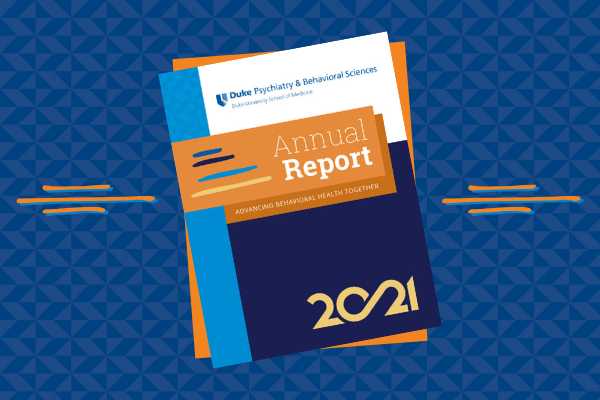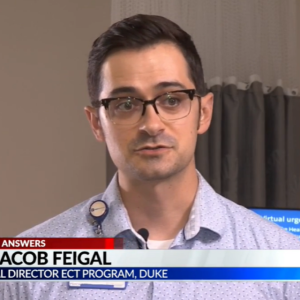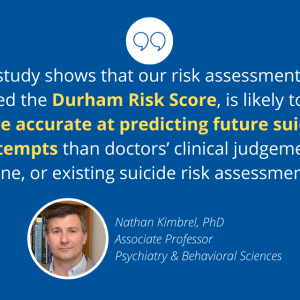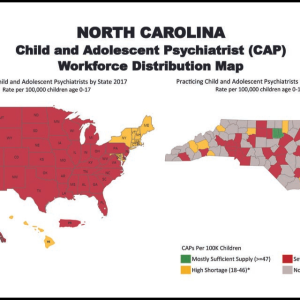
Advancing Behavioral Health Together
Our 2021 annual report features highlights from our clinical, education and research missions; diversity, equity and inclusion initiatives; new strategic plan; and philanthropic efforts.
Read Select Articles from the Report:
Child & Adolescent Psychiatry Fellows Are Becoming Trauma-Informed
Child & adolescent psychiatry fellows at Duke have a unique opportunity to develop expertise in trauma-informed approaches and care through a partnership between the Center for Child and Family Health, the North Carolina Child Treatment Program and Duke Psychiatry & Behavioral Sciences.
A Trusting Relationship: Duke Center Empowers Children With Eating Disorders and Other Conditions to Listen to their Bodies
The Duke Center for Eating Disorders created an online community that aims to help repair people's disrupted relationship with their bodies by empowering them to listen to, decode and respond to what their bodies are telling them—and ultimately develop a trusting relationship with their bodies.
$50K Gift Enables New Diversity, Equity & Inclusion Opportunities
The Department of Psychiatry & Behavioral Sciences is using a $50K gift to support pilot research projects focused on health disparities and work led by faculty members who are underrepresented in medicine, as well as other initiatives to promote diversity, equity and inclusion.
Local News Highlights Duke ECT Program & Patient
In a televised CBS-17 story, a Duke patient shared her positive experiences and outcomes with electroconvulsive therapy (ECT) after battling debilitating, treatment-resistant depression for more than 20 years. Jacob Feigal, MD, an assistant professor and the medical director of Duke Health’s ECT Program, was featured in the story.
Dzirasa Named to the National Academy of Medicine
Kafui Dzirasa, MD, PhD, the K. Ranga Rama Krishnan Associate Professor in the Department of Psychiatry and Behavioral Sciences, has been elected to the prestigious National Academy of Medicine.
Colin Smith’s “Why” Is Social Justice
Helping people — whether it be at a makeshift COVID-19 field hospital in New York City or through the Healthcare for the Homeless volunteer psychiatry clinic in Durham — is what drives internal medicine-psychiatry resident Colin Smith, MD, in his work as a physician.
TEDx Talk: How Racism Gets Under the Skin
In this TEDx Talk, Duke clinical psychology intern Briana Brownlow discusses the unique ways Black Americans often cope with chronic racial stress and how this coping strategy may serve as a potential mechanism through which racism impacts their physical and mental health.
Two Duke Brain Scientists Named Howard Hughes Investigators
Kafui Dzirasa, MD, PhD, the K. Ranga Rama Krishnan Associate Professor in the Department of Psychiatry & Behavioral Sciences, has been named a Howard Hughes Medical Institute (HHMI) investigator.
New Screening Tool Improves Ability to Identify Patients at Risk of Suicide
A suicide screening tool developed by researchers from Duke Psychiatry and the Department of Veterans Affairs is far more accurate at identifying patients at risk for attempting suicide than current clinical assessments, which often have poor accuracy rates that can lead to the loss of life.
Consultation Line Expands Behavioral Health Care Access
NC-PAL is a free provider-to-provider consultation line and education program available to all clinicians across the state for questions about behavioral health or psychiatric medication management for their pediatric and perinatal patients.









